Change Management Approaches And Outcomes
Organizational change is inevitable, resulting from strategic shifts, digital transformation or mergers and acquisitions among other disruptive forces.
Change management, the process of overseeing periods of change in terms of end users, workflows and service management, may impact how successfully the business navigates change. What are decision makers’ experiences of change management?
One minute insights:
 The majority of decision makers were currently in a period of change management or planning for one at the time of the survey
The majority of decision makers were currently in a period of change management or planning for one at the time of the survey Digital transformation efforts are the most common driver of change management
Digital transformation efforts are the most common driver of change management Change management is run internally by most, though engagement with external partners is common
Change management is run internally by most, though engagement with external partners is common Reduced time to execute vision is the top benefit of change management
Reduced time to execute vision is the top benefit of change management Leadership is the most identified factor for navigating change, but is also the most commonly cited issue decision makers have experienced
Leadership is the most identified factor for navigating change, but is also the most commonly cited issue decision makers have experienced
Change management is a common practice
81% of respondents were currently undergoing a period of change management.
Is your organization currently undergoing change management?
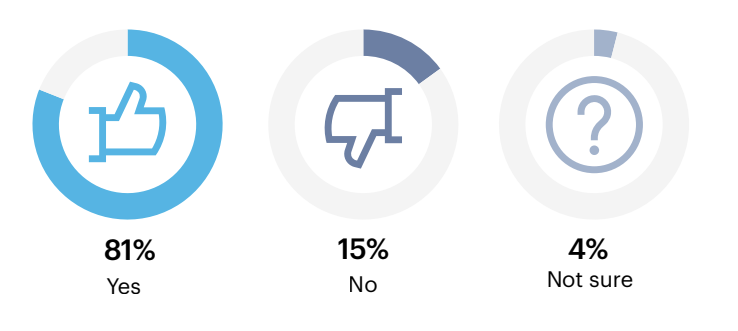
n = 347
Of those who weren’t currently undergoing a period of change management, 59% reported that their organization was planning for a period of change management in the future.
Is your organization planning for a period of change management?
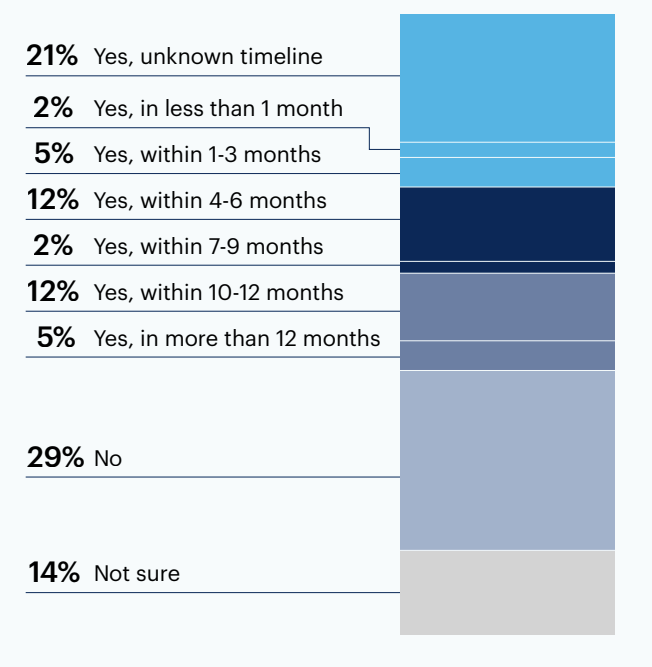
n = 66
Change management is often the most overlooked aspect of introducing change to an organization.
[Change management] is an underappreciated skill at most companies.
Digital transformation is the most common driver of change management, and most are satisfied with how it’s going
The most commonly reported driver of change management was digital transformation (64%), followed by strategic shift (44%) and remote/hybrid work (39%).
What was the reason behind your current need for change management?
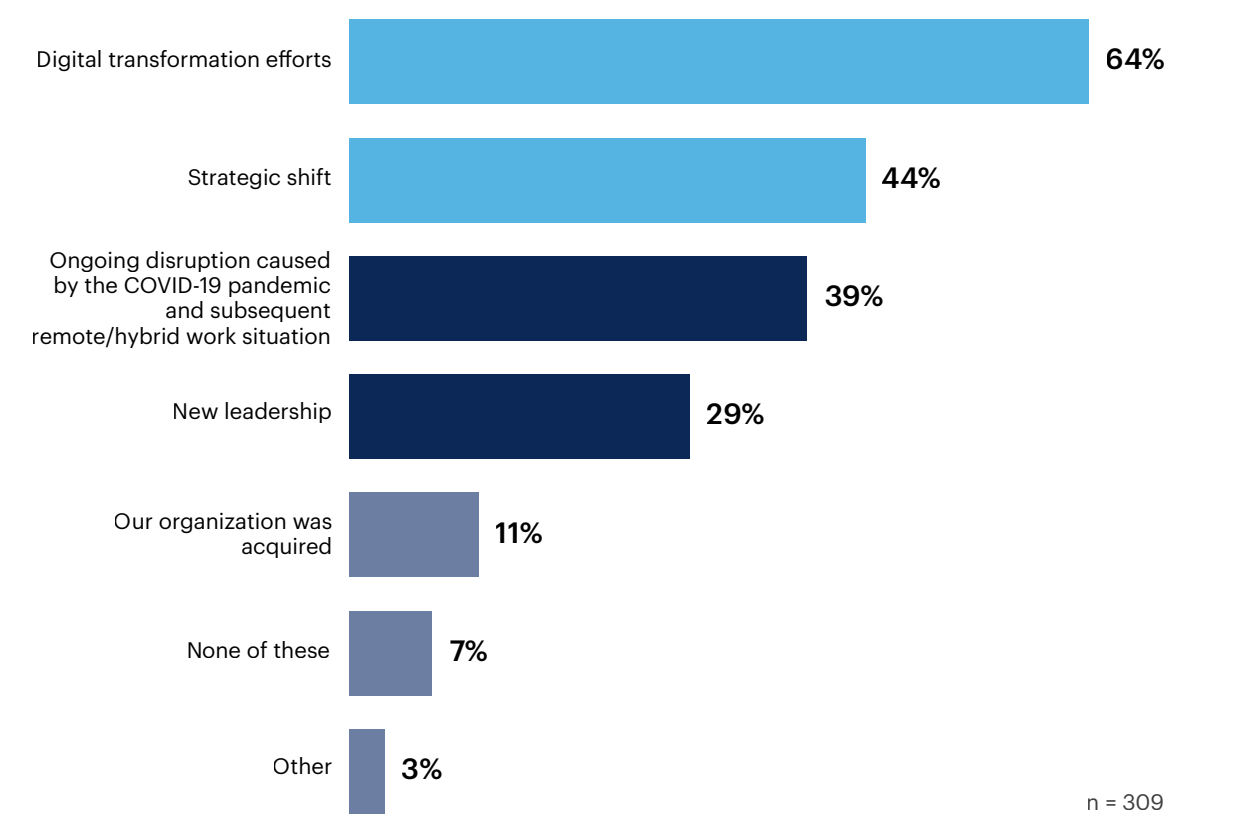
For those undergoing change management, 60% were satisfied with the initiative.
Are you satisfied with the impact of the change management initiative so far?
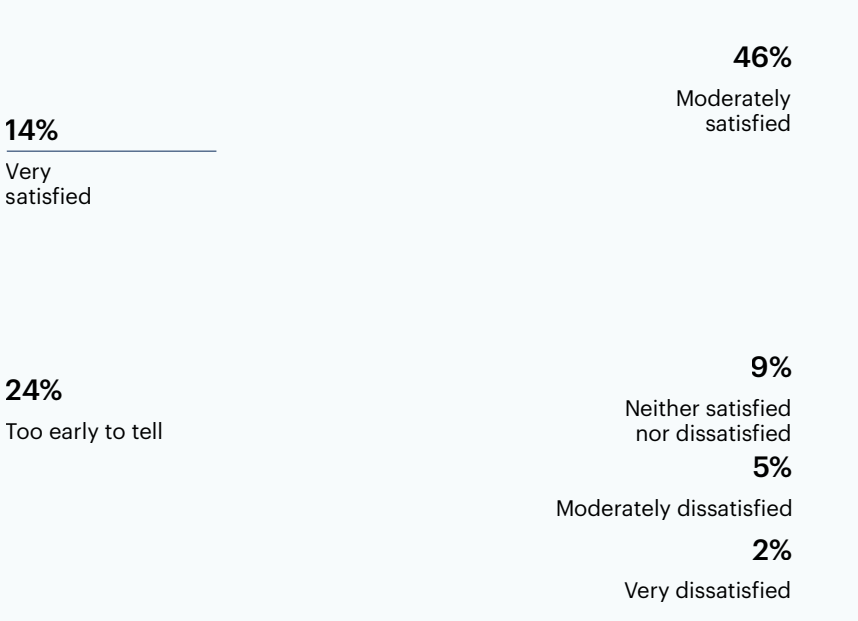
Scope and context of change does matter to how much change management is required. E.g. when we were spun off, very little was needed, since most everyone was primed for change.
Poorly communicated change [can] appear to be change for its own sake. Senior managers who create change initiatives should be rewarded for the results of the change and not for simply executing it. There is nothing more demotivating than seeing a senior manager promoted into the next great position, whilst everyone who has been affected by the change struggles for years to compensate.
Change management is mostly being driven by internal teams
Most (55%) decision makers reported that change management was primarily being overseen by internal partners.
However, 43% were engaging with an external partner to at least some degree.
Did you engage an external partner(s) to oversee change management?
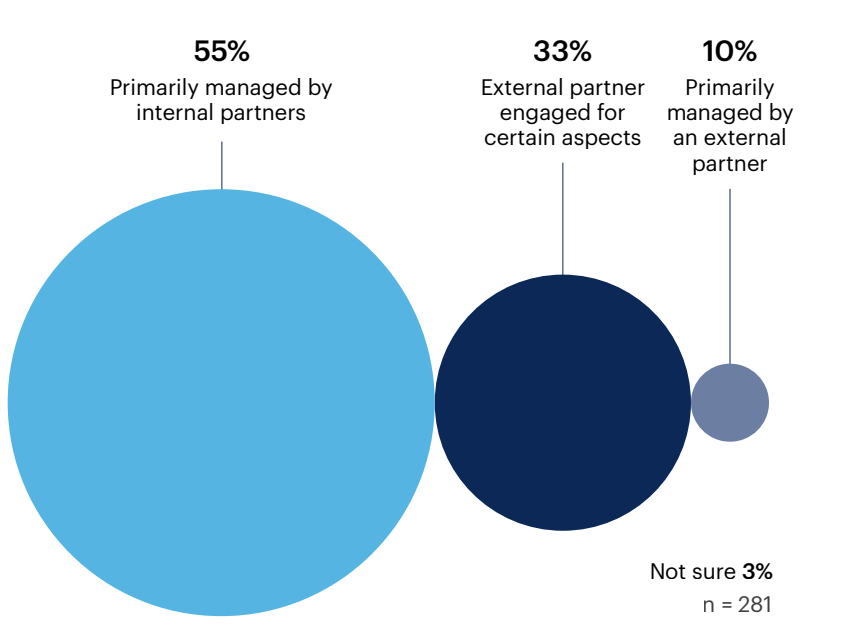
Of those who were engaging with an external partner, over two-thirds (71%) would recommend their external partner to a peer.
Would you recommend the external partner to a peer?
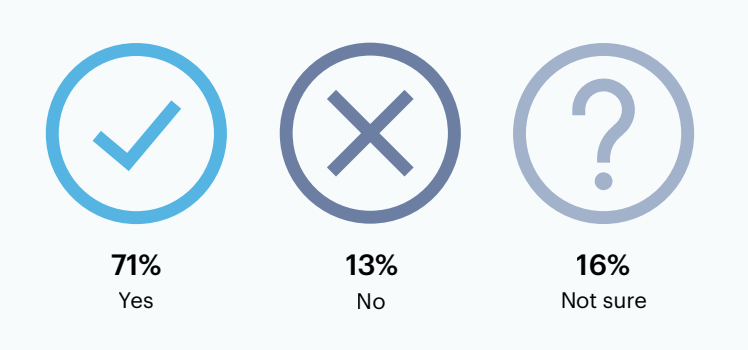
n = 119
Manage change fatigue by effectively communicating with those directly involved why change needs to happen.
When moving the company into a different direction I think it’s very important for a management change as well. Old brains can’t bring in new ideas.
The top benefit of change management is reduced execution time, while almost all agree that without change management, change is likely to fail
Most decision makers consider reduced time needed to execute vision as the top benefit of change management.
Other than achieving a successful outcome, which of the following is your top perceived benefit of change management?
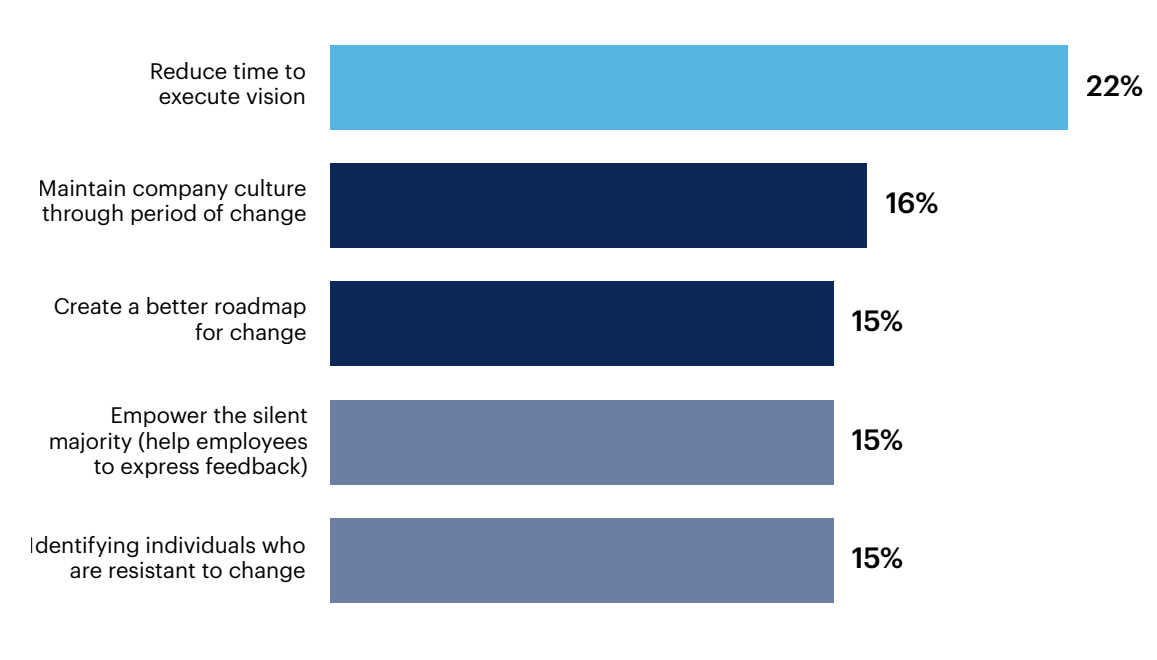
Identify gaps in the strategy/vision 12%, None of these 4%, Other 0%
n = 347
94% of decision makers agree that change without change management is likely to fail.
To what extent do you agree with the following: “Change without change management is likely to fail.”

Change management plays a crucial role in deciding the future of the organization and helps in strengthening the bond within the company and improvises the culture.
Culture is a crucial aspect to change management… Culture eats strategy for breakfast, as they say!
Leadership is the most identified critical factor for navigating a period of change, but also the most commonly cited issue decision makers have experienced
The most commonly cited critical factors for navigating a period of change are leadership (64%), employee feedback (53%), and communication (52%).
Which of the following are critical factors when navigating a period of change?
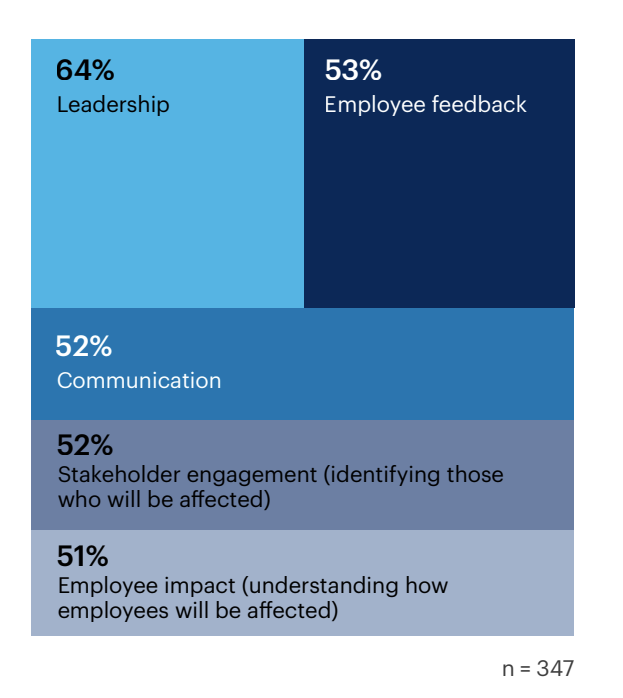
Willingness to course-correct (alter approach if necessary) 50%, Vision 44%, Transparency 40%, Time 39%, Management support 38%, Parting ways with those who don’t share the vision 6%, None of these 1%, Other 0%
The most commonly experienced issues during a period of organizational change are poor leadership (54%) and entrenched cultural mindset (51%).
Thinking about periods of organizational change at any point in your career, have you experienced any of the following issues?
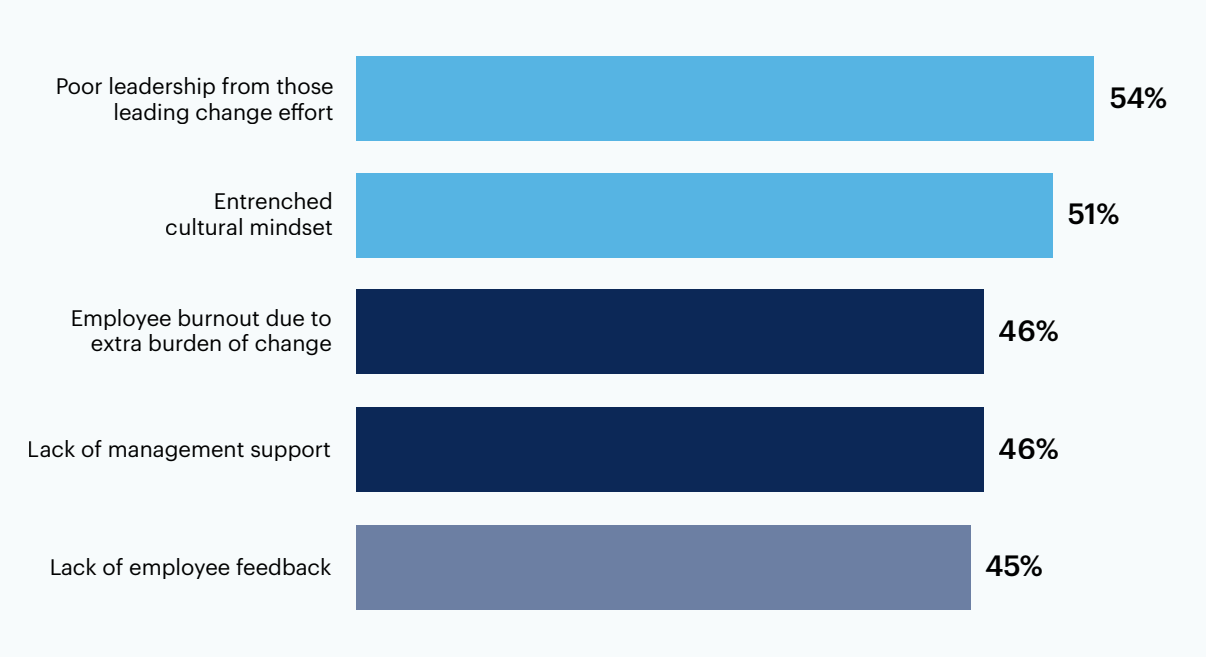
Insufficient time frame (change period is too long or too short) 39%, Failure to identify influential dissenters 35%, Failure to communicate why change is necessary/the value of change 30%, Poorly defined roadmap 23%, Strategy fixed/no course correction 18%, None of these 1%, Other 0%
[Organizations experiencing change] need to ensure all upstream and downstream areas of the change impact are identified and all key team members are identified and part of the team.
Based on my experiences, I think [change management] is an area that requires greater focus within organisations, as the implications of a poorly executed process can be very significant.
I have seen a stark difference between an organization with a traditional/static leadership structure and organizations that were built agile from the beginning. The first type always struggled to manage change properly while the latter is built with change in mind.
Having gone through significant changes through acquisitions and re-organizations, communication is critical and I have never seen it done well. I have seen some communications be complete lies, ‘We don’t plan on any reductions in staff,’ only to have layoffs 2 weeks later. Our organization takes 6-8 weeks to review layoff lists, review with HR and Legal. Don’t communicate bald-faced lies. Your employees know better.
One of my favorite quotes is ‘People don’t resist change. They resist being changed.’ People are the biggest component in change management. People will resist if they don’t understand the value and benefits of change.

Want more insights like this from leaders like yourself?
Click here to explore the revamped, retooled and reimagined Gartner Peer Community. You'll get access to synthesized insights and engaging discussions from a community of your peers.
Respondent Breakdown

This content, which provides opinions and points of view expressed by users, does not represent the views of Gartner; Gartner neither endorses it nor makes any warranties about its accuracy or completeness.
Source: Gartner Peer Insights, Change Management: Approaches and Outcomes survey